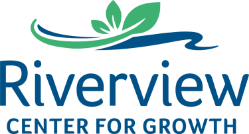

Research Department
The Riverview Center for Growth research department serves four key functions for the agency, including research, data systems and usage and analysis, program evaluation, as well as grant writing and management.
Our research department provides other support internally by developing and administering satisfaction surveys, completing internal research requests for agency management, helping with a data-centered approaches across the agency, sharing professional development opportunities and providing the latest articles, reports and findings with Riverview leadership, supervisors and staff.
We also conduct our own research. In 2021, for example, we received a gift of $125,000 from the Murdock Foundation Charitable Trust to complete a mixed methods evaluation of the impacts the COVID-19 pandemic had on client engagement and client outcomes with a specific emphasis on telehealth.
The Riverview research department writes and manages grants for the agency. Grant awards are essential because they support our many programs, provide funding for needed supplies and help improve infrastructure. The following list includes recent grant awards. We wish to thank each of our generous sponsors for their support of our programs and services.
We wish to thank each of our generous sponsors for their support of our programs and services!
| SPONSOR | PROGRAM | AWARD |
|---|---|---|
| Oregon Health Authority | Clinical Supervision: Expanding Culturally and Linguistically Specific Care | $194,589 |
| Coquille Tribal Community Fund | Day Treatment: Classroom Supplies for 2024 | $5,000 |
| Sierra Pacific Foundation | Parent Education: Training for Conscious Discipline | $2,500 |
| Oregon Department of Education | Community of Practice: Peer Support for students experiencing housing instability in Eugene 4J School District | $264,926 |
| Eugene Active 20-30 Club | Day Treatment: Classroom Supplies | $1,250 |
| Cow Creek Umpqua Indian Foundation | Emergency Wellness Fund (Basic Needs and Houselessness) for 2024 | $10,000 |
| Braemar Charitable Trust | Assessment: Training on SIVRA Risk Assessment | $9,830 |
This report is a mixed-methods case study on the impact of the COVID-19 pandemic on Riverview’s service delivery, client outcomes, and cost-effectiveness. The systematic literature review summarized the potential of telehealth as a modality in behavioral and mental health. Our research used both qualitative and quantitative analyses covering a wide range of available and new data. Our research team talked to practitioners to learn about their perspectives and
experiences. Parents and caregivers also provided feedback on their experiences with telehealth. Within these three areas of inquiry, our research demonstrated
the varied benefits and limitations of telehealth, with nuanced impacts for clients and healthcare providers.


